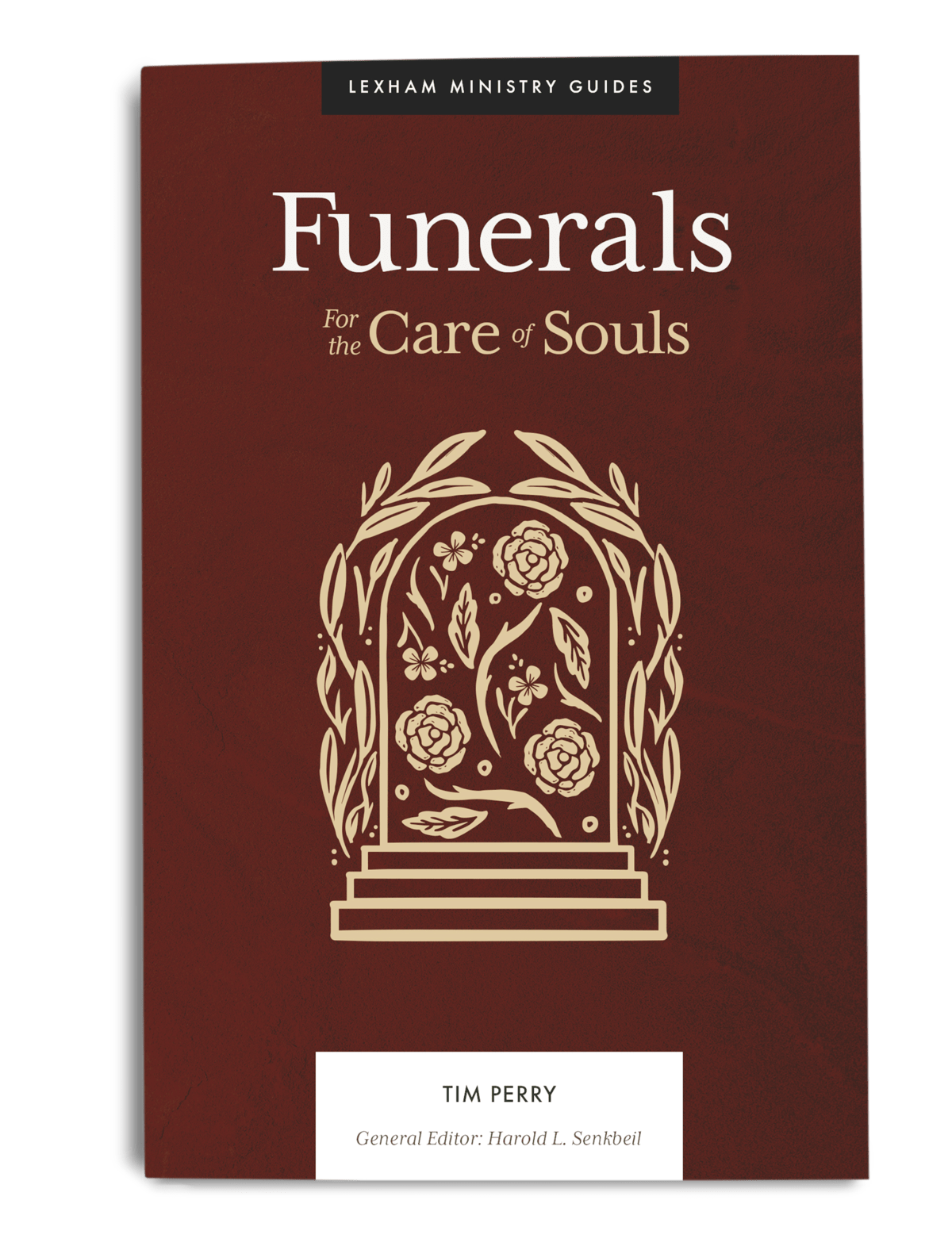In this excerpt adapted from Funerals: For the Care of Souls, Tim Perry explores the Christian understanding of death, dying, and the afterlife.
***
A Christian understanding of death … [does not] trivialize or objectify it. In the Christian imagination, death presents us with the mystery of life held in the hands of God—life that is not our own, that is fragile and limited. It presents death as the great severer of all loving relationships, as the punishment for sin, and as the final enemy. That’s the bad news. And it’s where we must begin.
In our current context, we must begin here lest we trivialize death and so lose our capacity to speak meaningfully about it. So let’s start with a simple observation: death is not an inconvenient hiccup in one long, perhaps eternally extended, happy life, but rather the end. The oldest strata of the Old Testament affirm this. Whatever comes after (and we’ll discuss what comes after) ought not to be seen as undoing this basic recognition.
In the stories of the patriarchs, the goal and good of this life were bounded entirely in this life. The ideal was to see the covenant faithfulness passed on to the next generation and the next—to work and prosper, to bounce grandchildren on one’s knee, and then to die old and full of years and be gathered to the ancestors. Sheol in Hebrew (or Hades in Greek) was a place of witless shades and mindless mutterers, home to good and evil alike, cut off from the presence of the God of Life, and from where no one gave him praise.
In this much, the early Israelite understanding of death resembled very much that of Homer and the great Greek myths. Little, if anything, could be said about “after death”; whatever it was, it wasn’t good. It wasn’t oblivion, but it wasn’t life either. Happiness was entirely a bodily reality. In the New Testament, this view was represented by the Sadducees, the temple elite, who insisted that in their narrow canon (the five books of Moses), there was no promise of an immortal soul or a bodily resurrection. The good life to be attained in faithfulness to God was attained in this life.
This simple but by no means naïve view of death and the goodness of this life is developed by later strata of the Old Testament and Jesus’ teachings, to say nothing of his death and resurrection. But wherever we end up, we must start here. Death is the end. And that means that heaven as an uninterrupted family reunion simply will not do. Death is a break with life.
Death, the severer of relationships
[Death] is, then, the severer of loving relationships. A familiar biblical metaphor deserves full and serious reflection here. To die is to be cut off from the living, to be cut off even from God:I am overwhelmed with troubles
and my life draws near to death.
I am counted among those who go down to the pit;
I am like one without strength.
I am set apart with the dead,
like the slain who lie in the grave,
whom you remember no more,
who are cut off from your care.
(Ps 88:3–5 NIV)
To “go down to the pit” is in some way to be at once utterly alone and with the dead. And that means our goodbyes to our loved ones are final. And frankly, it’s bad for us to minimize that.
The Bible recognizes death—the end of life and the severer of relationships—as the consequence and wages of sin. This is a fate we have brought upon ourselves by our rejection of the God of Life for idols. In other words, death is a punishment that is not so much wielded by God as permitted by God. God’s wrath, in its purest expression, is to allow us to experience the consequences of our own abuse of his gift of freedom and the rejection of his gift of life. We surrender our life step by step to our sin, and we die. All that remains is the sin that consumes us from the inside out.
C. S. Lewis offers a powerful portrayal in his parable of the afterlife, The Great Divorce. On his guided tour of heaven, Lewis overhears a fellow ghost complaining about all the hardships she had to endure in life, and he can’t imagine that she ought to be condemned to hell simply for that. She needs only to be treated kindly to be redeemed. George MacDonald, his afterlife tour guide, responds:
The whole difficulty of understanding hell is that the thing to be understood is so nearly Nothing. But ye’ll have had experiences.… It begins with a grumbling mood, and yourself still distinct from it: perhaps criticising it. And yourself, in a dark hour, may will that mood, embrace it. Ye can repent and come out of it again. But there may come a day when you can do that no longer. Then there will be no you left to criticise the mood, nor even to enjoy it, but just the grumble itself going on forever like a machine.
One way to understand hell—which we’ll explore later—is to conceive of it as the death of the self even as the self’s sin continues into eternity. The Bible speaks of death as the end, as severer, punishment, and enemy—the last enemy, in fact (1 Cor 15:26). And the last bit of bad news is that this last enemy will defeat us. Always. “Did we in our own strength confide, our striving would be losing.” Luther’s hymn puts the matter starkly and accurately.
When finally confronted by the ravening maw of death, before whom even the universe must succumb, perhaps all there is to do is to dance on the edge until we tip over into blessed oblivion. No Promethean raging against going quietly into the good night will arrest the inevitable. We will all acquiesce. While we might take a different route to get there, we Christians must acknowledge that the deification of death is not far wrong. Indeed, it is half right. Did we in our own strength confide, the striving would be losing. The most for which to hope is a final hand that makes our slip into Nothing as painless as possible.
Death reread
But the Bible does not stop with the bad news about death. It rereads all of the above in the light of the life of Jesus. In doing so, the Bible at once recognizes the reality of the bad news and daringly asserts that it is, in God’s ultimate goal, good news—such that death is no longer simply the end but is also a new beginning.
This is not because of anything inherent in human beings. Christians do not believe—as the great neo-Platonic philosopher-mystic Plotinus did—that sloughing off our bodies frees our immortal souls to return to our true disembodied home. Rather, for the Christian, death is, in all its awful final weightiness, the completion of our identification with the Lord Jesus in this life. Death is an identification stamped on us in our baptisms: “Do you not know that all of us who have been baptized into Christ Jesus were baptized into his death?” (Rom 6:3).
Our identification with Jesus, marked by our baptisms, means that for Christians, death is indeed the end of this life—not as an abandonment into Nothing but the final abandonment into the One who tasted death for all, and so removed its sting. It is the fullest abandonment into Christ, and as such, is an abandonment into Life more abundant than we can now ask or imagine. Saint Paul continues, “We were buried therefore with him by baptism into death, in order that, just as Christ was raised from the dead by the glory of the Father, we too might walk in newness of life” (Rom 6:4). This abandonment of life for Life through identification with Christ begins even now, and carries on, in some way, forever. Thus, Dietrich Bonhoeffer’s last recorded words are spoken for us all: “This is the end. For me, the beginning of Life.”
Our identification with Jesus, marked by our baptisms, means for Christians, death is indeed the end of this life—not as an abandonment into Nothing but the final abandonment into the One who tasted death for all, and so removed its sting. It is… Share on XThe Christian understanding of death, dying, and the afterlife
We can press this further. As our abandonment—not to Nothing, but to the good care of the Lord Jesus—death is not the great severer of relationships but the transformation of all relationships through union with the risen Lord. As we have seen, the bad news of death precludes any imagining of heaven as an extended family reunion. It sets in its place union with Christ and says, this is our true end, the goal toward which we, in grace, were created to strive toward and finally attain.
My wife powerfully experienced this truth several years ago when contemplating heaven while reading The Great Divorce. At one point, she had conceived of heaven as a place where she would be reunited with her mother, who died a year before we came to meet; later on, as a mother herself, she viewed heaven as a place where she would continue to know and love her children. But Lewis provoked a discomfiting question: “Why is union with Jesus not enough in itself?” The good news of death is that it marks the completion of our union with Christ begun at our baptisms. If we are reunited with our loved ones, drawn up together with even the saints and angels of every age, it is only insofar as we share in a common union. It is the union with Christ, who is our Life, that transforms the severer of relationships into a greater, more powerful union.
As the fullest moment of our union with Christ foreshadowed in our baptisms, death for the Christian is finally the embrace of eternal Life. Death is not an abandonment to Nothing, whether fearfully, defiantly, or happily, but an abandonment to the Lord, who calls the things that are not as though they are, who by his Spirit, fills us with his Life. So yes, death is the final enemy, and against him, in our own strength, the battle is indeed lost.
Were not the right Man on our side,
The Man of God’s own choosing.
You ask who that may be? Christ Jesus, it is He;
Lord Sabaoth His Name, From age to age the same,
And He must win the battle.
Luther’s mighty hymn gives us the tools with which to read death in a Christian way. It is Christ who defeats death, and in so doing, transforms it into a new beginning, a union (and hopefully reunion) in the fullness of the divine love. In Christ alone, death becomes a gateway to eternal Life. And that is good news indeed.
Conclusion
None of this, of course, means that for the Christian the prospect of dying is undertaken without fear, without anxiety, without difficulty. Dying, even for the believer, is hard work. If our Lord himself can say with a troubled soul when confronted by the prospect of his own encounter with death, “What shall I say? ‘Father, save me from this hour’?” (John 12:27). No, the prayer of our Lord in Gethsemane is the prayer for all who die in the peace of Christ: “My Father, if it is possible, may this cup be taken from me. Yet not as I will, but as you will” (Matt 26:39 NIV).
In my experience with dying people, I have seen people whose lives and confessions left me in no doubt about their heavenly home seize upon Christ and rest in their union with him, and I have seen others, sometimes even more saintly, express fear. My father, who was a godly example to me and many, asked my wife whether he was really going to heaven shortly before he was moved into palliative care.
I am reminded of the disparate experiences of Hopeful and Christian, the main characters in John Bunyan’s allegory, The Pilgrim’s Progress. When they came at last to the Celestial City, there was one final barrier: a river whose current was strong and whose bed was deep. Exhorted to trust in the King of the City and cross the river, they began to wade. Christian called out to his friend, “I sink in deep waters, the billows go over my head; all his waves go over me.” Hopeful replied, “Be of good cheer, my brother; I feel the bottom, and it is good.”
Dying is hard work. And the invitation to rest in Christ, or in Bunyan’s fine phrase, to trust in the King of the City, is for some like Hopeful, easy. For many of us, though, Christian’s difficult transition resonates more.
Whether we in our final moments emulate Hopeful or Christian, the goal of the Christian death is the same: the surrender of life to Christ, to the one who is Life, who will not let his chosen ones languish in the grave but will bring them into resurrection.
***
Read more about the Christian understanding of death, dying, and the afterlife—and why Tim Perry says pastors (and those they shepherd) need a renewed vision of the traditional Christian funeral liturgy in Funerals: For the Care of Souls, available from Lexham Press.
Related articles
- The Death Side of Life: Paul’s Scars and the Meaning of Good Friday
- Has Your Congregation Ever Heard a Sermon on Suicide?
- How to Write a Funeral Sermon: 4 Principles to Herald God’s Message
- What Will It Be Like? Imagining the New Heavens & New Earth
Related resources
Preaching Hope in Darkness: Help for Pastors in Addressing Suicide from the Pulpit
Regular price: $16.99
A Quiet Mind to Suffer With: Mental Illness, Trauma, and the Death of Christ
Regular price: $13.99
Finding Hope in a Dark Place: Facing Loneliness, Depression, and Anxiety with the Power of Grace
Regular price: $11.99
God of All Comfort: A Trinitarian Response to the Horrors of This World
Regular price: $21.99
How Should We Then Die? A Christian Response to Physician-Assisted Death
Regular price: $12.99







